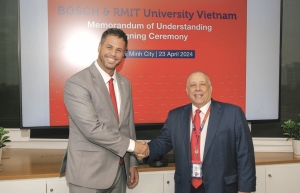FIE and university tie-ups to breed high-tech workforce
According to a report on Vietnam’s labour shift towards 2030, delivered at a seminar on future labour trends on May 29, demand for labour across various economic sectors is shifting from state to private and foreign-invested enterprises (FIEs), which have a significant demand for highly skilled workers, particularly in areas like AI.
 |
| FIE and university tie-ups to breed high-tech workforce, Photo: Shutterstock |
At the seminar, Tran Quang Huy, head of Training at the FSB Institute of Management and Technology, said enterprises have high demand for the digital competencies of their workforce.
“There are five key factors that large enterprises seek in high-level personnel and are willing to train for the labour workforce from universities: systematic and thorough understanding of business management, finance, and human resources; logical thinking, analytical, and synthesising abilities; proficiency in foreign languages; digital technology skills; and the ability to adapt to a multicultural work environment,” Huy said.
The International Monetary Fund predicted at the World Economic Forum earlier this year that by 2030, more than 40 per cent of the workforce will be affected by AI, and two-thirds of leaders will not hire individuals lacking AI competencies.
“The era of one-way educational exchange is certainly over. Vietnamese educational institutions and enterprises need to do exceptional work in areas such as IT and AI. This presents a robust foundation for collaboration between global institutions and Vietnamese ones. So the tech sector and AI research is certainly an area of opportunity,” said William Badger, co-chair of the Human Resources and Training Sector Committee under the European Chamber of Commerce in Vietnam.
Building on this, joint initiatives, particularly in AI, could lead to groundbreaking advancements, fostering provisional growth. In which, FIEs’ support in technical skills and industry-specific knowledge for Vietnamese universities are essential.
“Many European companies like Schneider Electric are looking for expertise in electrical engineering and automation technologies, and proficiency in software tools like System Application Programming, AutoCAD, or industry-specific applications,” Badger added.
In a presentation at a forum on May 22 featuring FIEs and higher education institutions, a JobTest representative noted that Vietnam’s higher education institutions traditionally focus on theoretical knowledge rather than skill-based training tailored to the real needs of businesses.
“This leaves graduates unprepared for the practical demands of workplace skills. By bridging this gap, Vietnam can cultivate a smarter workforce that is adaptable, innovative, and industry-ready,” the representative said.
Nguyen Tien Dung, deputy director of the Department of International Cooperation under the Ministry of Education and Training, said that universities and FIEs need to strengthen cooperation in research and development through investment in equipment.
“Key laboratories equipped with modern facilities funded by international enterprises and research development centres serve the continuous training needs of businesses,” Dung said. “Alternatively, enterprises can send engineers to universities for joint training to enhance the quality of the workforce. From this, along with structured guidance, universities can develop and bring products to the economic market.”
Thomas Jacobs, country manager for the Mekong region of the International Finance Corporation, added that if more can be learned about sustainability, more job-ready students will be created.
“This aligns with the idea that students should leave university with an understanding of their company’s green requirements and initiatives. For European markets, in particular, being able to follow the environmental path and the green footprint of a product is crucial,” Jacobs said.
“Moreover, soft skills for high-tech workers such as effective communication, both in writing and verbally, teamwork and collaboration, professional and ethical standards, reliability, time management, and cultural awareness are highly valued. Understanding and appreciating different cultures are crucial for working in an international environment,” Jacobs added.
In the journey of training a high-quality technical workforce equipped with comprehensive knowledge of technology and innovation, the government plays a crucial role in enhancing the connection between FIEs and universities in workforce training.
“In developed countries like Japan, the solution is to promote a comprehensive ecosystem between universities, businesses, and the government to leverage the strengths of each role in training and maximising the potential of high-quality human resources,” said Vu Kim Chi, representative of the Mitsubishi Research Institute at Mitsubishi Ecosystem Japan.
The institute has established initiatives that bring together over 600 governments, universities, businesses, and student startup projects. In Japan as a whole, various ministries have directly invested approximately $1 billion in public-private funds into universities to establish innovation programmes.
“Vietnam can gradually learn and adopt this model into its system to enhance training connections between foreign-led companies and Vietnamese universities in developing a high-tech workforce,” added Chi.
| A strengthened high-tech workforce for semiconductors Vietnam has plenty of work to do if it wants to become a true global hub for semiconductor manufacturing. Dr. Quan Le, principal investigator for the Semiconductor Workforce Development Research Grant under Fulbright University Vietnam, covered the potential for Vietnam and how to reach it with VIR’s Vy Vy. |
 | Bosch and RMIT forge partnership on future workforce development Bosch Vietnam on April 23 signed a MoU with Royal Melbourne Institute of Technology Vietnam (RMIT) to collaborate and nurtures the next generation of factory professionals. |
What the stars mean:
★ Poor ★ ★ Promising ★★★ Good ★★★★ Very good ★★★★★ Exceptional
Related Contents
Latest News
More News
- SK Innovation-led consortium wins $2.3 billion LNG project in Nghe An (February 25, 2026 | 07:56)
- THACO opens $70 million manufacturing complex in Danang (February 25, 2026 | 07:54)
- Phu Quoc International Airport expansion approved to meet rising demand (February 24, 2026 | 10:00)
- Bac Giang International Logistics Centre faces land clearance barrier (February 24, 2026 | 08:00)
- Bright prospects abound in European investment (February 19, 2026 | 20:27)
- Internal strengths attest to commitment to progress (February 19, 2026 | 20:13)
- Vietnam, New Zealand seek level-up in ties (February 19, 2026 | 18:06)
- Untapped potential in relations with Indonesia (February 19, 2026 | 17:56)
- German strengths match Vietnamese aspirations (February 19, 2026 | 17:40)
- Kim Long Motor and AOJ Suzhou enter strategic partnership (February 16, 2026 | 13:27)

 Tag:
Tag:


















 Mobile Version
Mobile Version